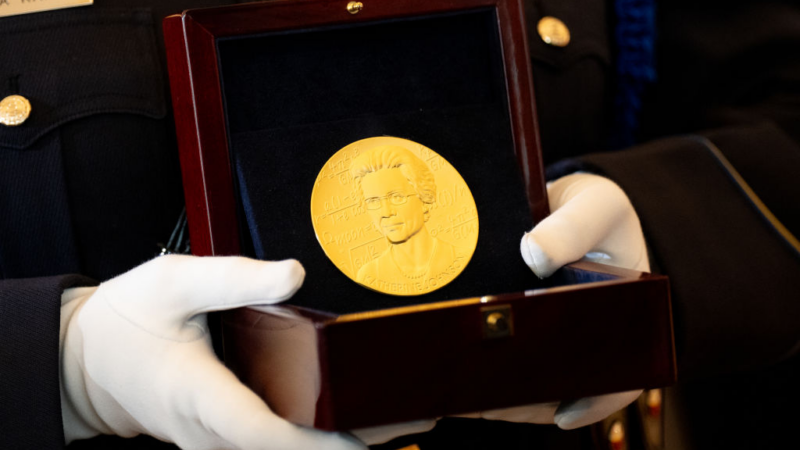NASA’s ‘Hidden Figures’ awarded Congressional Gold Medals for pioneering space work
A group of Black female scientists and mathematicians known as NASA’s “Hidden Figures” were honored with Congressional Gold Medals on Wednesday, the highest award given to citizens by Congress, for their contributions to space exploration.
Katherine Johnson, Mary Jackson, Dorothy Vaughan and Christine Darden were awarded the distinction along with other women for their contributions to developing the U.S. space program during the decades-long space race.
NASA Administrator Bill Nelson praised the women and said they “made it possible for Earthlings to lift beyond the bounds of Earth, and for generations of trailblazers to follow.”
“The pioneers that we honor today, these Hidden Figures — their courage and imagination brought us to the Moon. And their lessons, their legacy, will send us back to the Moon and then, imagine, just imagine, when we leave our footprints on the red sands of Mars,” Nelson said.

While working at a segregated department at NASA’s Langley Research Center, the four women, who became known as “human computers” for their mathematical abilities, calculated projections for key projects, including the 1969 Apollo 11 mission, which allowed the U.S. to be the first to land on the moon, beating the Soviet Union during the heated space race between the two countries.
Johnson also played a key role in helping astronaut John Glenn become the first American to orbit the Earth in 1962. Glenn did not trust orbital calculations done by computer and requested that Johnson run all the same equations by hand.

“If she says they’re good,’” Katherine Johnson remembers Glenn saying, “then I’m ready to go.” The mission was a success.
The women were not only successful as mathematicians. Jackson became NASA’s first Black female engineer in 1958 and Vaughan the first Black female supervisor of the National Advisory Committee for Aeronautics in 1949. Darden, who is known for her research on sonic booms and supersonic aircraft noise, became the first Black woman at NASA’s Langley Research Center to be appointed to the ranks of top management in its senior executive service.
The book Hidden Figures by Margot Lee Shetterly chronicled the women’s experiences and the discrimination they overcame. It was adapted into a film of the same name and released in 2016.
The Hidden Figures Congressional Gold Medal Act, introduced by late Texas Rep. Bernice Eddie Johnson in 2019 and signed into law the same year, directed Congress to honor each of the four women with a medal. It also authorized a fifth medal to recognize all women who served as computers, mathematicians and engineers at the National Advisory Committee for Aeronautics and the National Aeronautics and Space Administration between the 1930s and ’70s.
Vaughan, Johnson and Jackson were honored posthumously, with their families accepting the awards on their behalf. Darden watched the ceremony from her home in Connecticut; her family also accepted the honor in her place.
Andrea Mosie, Apollo Sample Lead Processor at NASA’s Johnson Space Center, accepted the fifth medal.
House Speaker Mike Johnson remembered the women as “giants on whose shoulders all of those astronauts actually stood” and said their work proved that America’s strength “lies in our ability to harness the talents of all of our citizens and to look beyond divisions.”
“At a time in America when our nation was divided by color and often by gender, these women dared to step into the fields where they had previously been unwelcomed. They excelled in science and math and made groundbreaking contributions in aeronautics.”
“But these women didn’t just crunch numbers and solve equations for the space program. They actually laid the very foundation upon which our rockets launched and our astronauts flew and our nation soared,” Johnson said.
Migrants show up at Logan for shelter, prompting fresh calls for state to change policies
An advocate for migrant families said he believes some families are reluctant to go into a temporary shelter, because it prevents them from getting longer-term emergency housing support.
Muslim voters say they don’t feel understood or welcomed by Republicans or Democrats
This year, some American Muslims say they feel politically homeless — not understood or welcomed by either Republicans or Democrats.
Five states planning to execute prisoners this week despite federal moratorium
Despite a federal moratorium, there have already been thirteen state executions this year. And in the next week, five people are scheduled to die.
Sudanese refugees are struggling after fleeing to Chad. Locals are being strained too
Hundreds of thousands of Sudanese refugees have fled to Chad, where they're facing increasingly difficult conditions as their presence strains local resources and humanitarian aid organizations.
New data sheds light — and raises objections — on COVID-19 origins
New data samples from the Wuhan market points to an intermingling of SARS-CoV-2, raccoon dogs and humans. The authors of a new paper say it bolsters the animal origin theory. Other researchers object.
The state of the presidential race in rural Georgia
Former President Donald Trump has lots of support in rural Morgan County, Ga., where immigration is a major concern.



